Advertisement
'Repair Cafes' in Mass. build community by restoring busted home goods once destined for landfills
Resume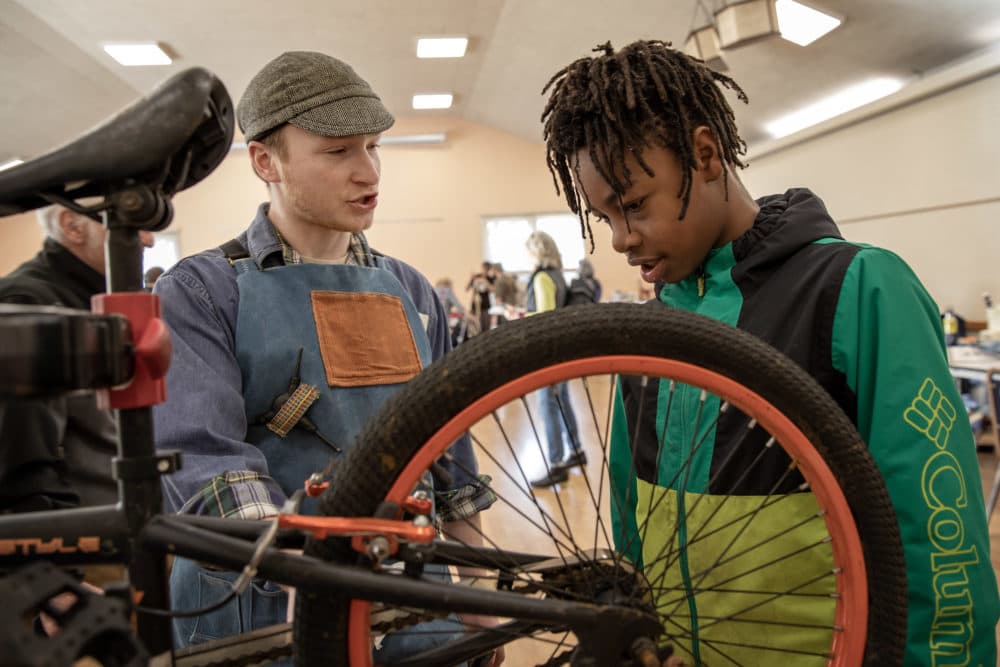
People, mostly strangers, carrying broken household items file into the First Parish church social hall in Framingham. One man arrives with a torn backpack. Another holds an iPad that refuses to turn on. A woman hauls bikes and gardening tools out of her car. The lobby fills up with lamps, coffee makers and sewing machines.
They’re here for a Repair Cafe, where volunteers try to fix whatever comes through the door — for free. The goal: to reduce what gets buried in landfills and keep people using what they already have.
“The society we're in is all driven on digging more things up out of the earth, turning them into products and then sending them to a landfill as fast as we can,” says Alex Volfson, one of the organizers.
“It doesn't seem like a good plan — if you think of us living on a finite ball called the Earth — because you'll eventually run out of things to dig up and places to throw them.”
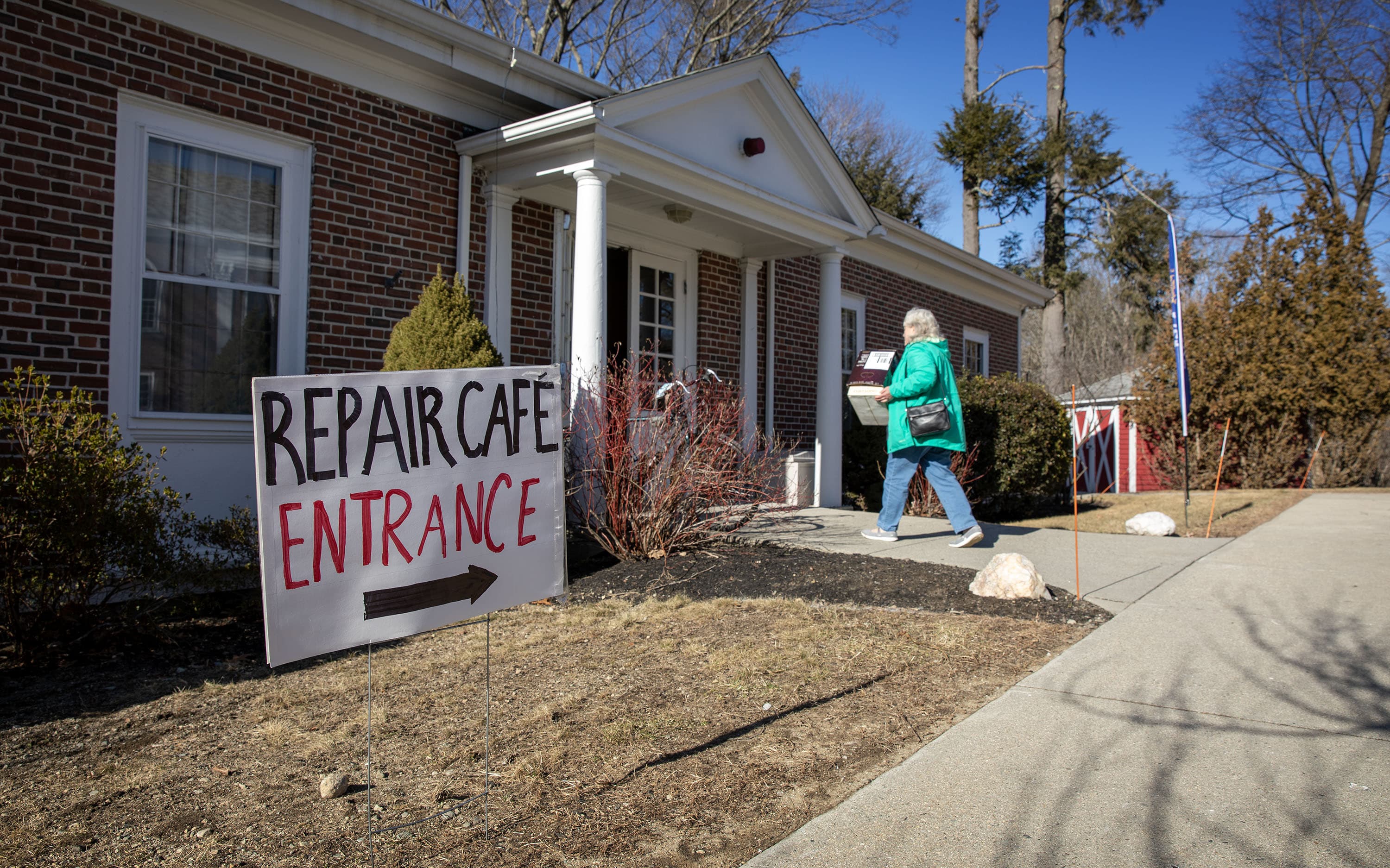
Inside the hall, roughly 30 volunteers wait at portable tables, behind sewing machines, soldering guns and tool boxes filled with parts and supplies.
Leslie White Harvey is the first customer from the long line outside. She heads straight for the watch repair table carrying a rhinestone-covered watch she picked up at a yard sale for a dollar.
“Isn’t it beautiful?” she asks. “I have my sports watch, but sometimes I like to dress up.”
Volunteer Foss Tighe specializes in battery replacement. If a new battery doesn’t restart White Harvey’s jewel, she'll be directed to someone else. Tighe pries the back off her watch, pops out the old battery and replaces it with one plucked from his tool box. The glittering watch starts ticking.
It’s Tighe’s fourth Repair Cafe, so he knows which batteries he’ll most likely need. He orders them in bulk for about 50 cents each.
“Now for a dollar, you have a perfectly fine, running watch,” Tighe tells White Harvey. “Oh, and another 50 cents for the battery.”
It’s a good deal.
“Absolutely,” says White Harvey with a grin, “really fantastic.”
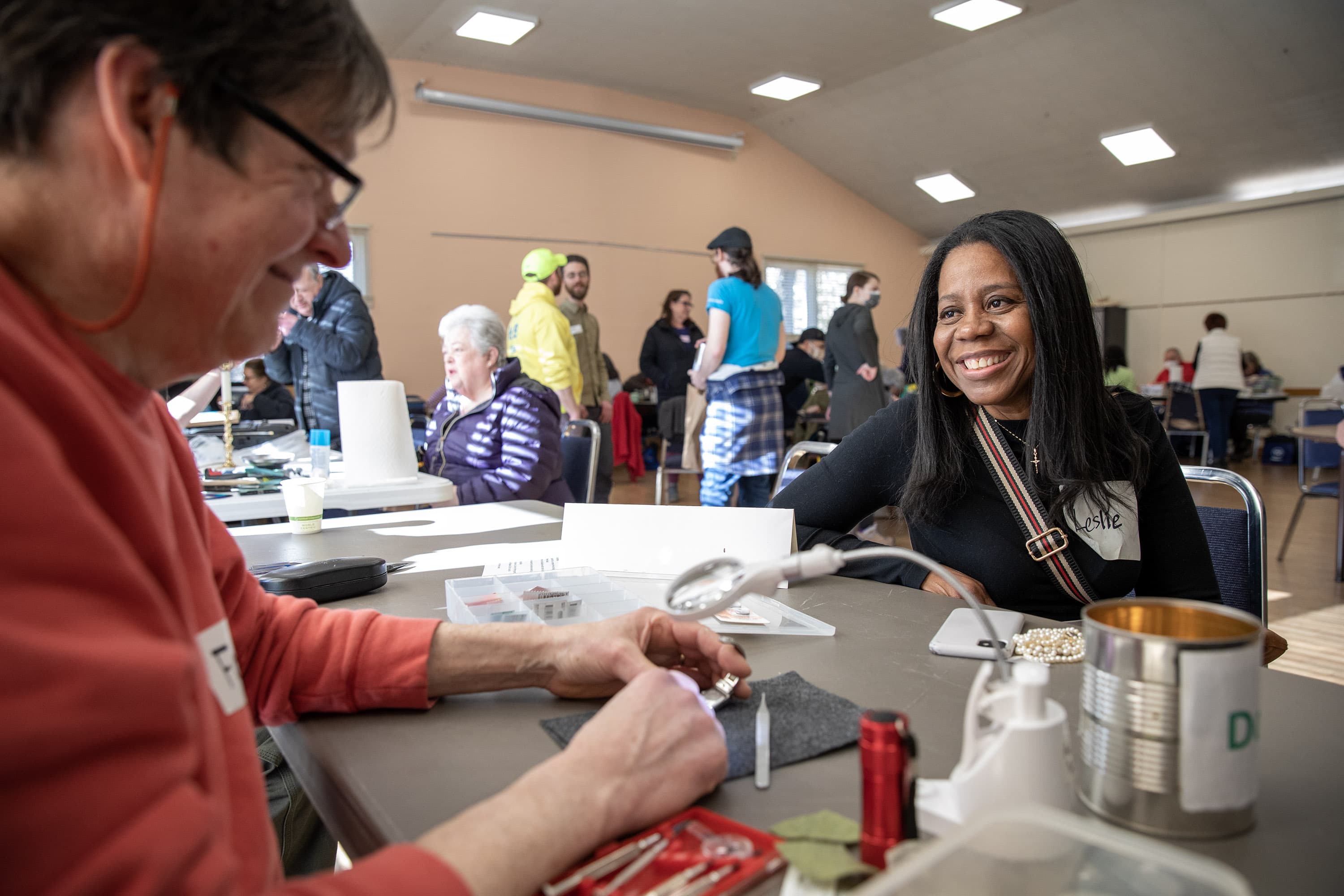
Amsterdam hosted the first Repair Cafe in 2010; it’s since grown to more than 2,600 worldwide. The international organizers estimate they keep about a half million articles out of landfills worldwide every year.
“On a global scale, that’s very little,” says Martine Postma, the founder and director of Repair Cafe International Foundation. “I’m not satisfied at all.”
But Postma says repair cafes bring many other benefits. They help guests see how they can live with less, save money, rely on neighbors for help. Fixit Clinics, another grassroots repair movement, share some of the same objectives.
After pausing during COVID, the Framingham group is aiming for three cafes this year. Organizer Marybeth Croci, with the Rotary Club of Framingham, says she doesn’t have any trouble finding people willing to spend a Saturday afternoon fixing items for strangers.
“Our volunteers love it,” Croci says as a small woman arrives with a sewing machine, hoping to squeeze in at the sewing repair table. “Can you guys make room? Toby’s really tiny,” Croci asks, laughing.
There’s a wide range of expertise here — from knitters to electricians to software and mechanical engineers. It’s hard to predict what services will be in demand.
"We hope for the best," Croci says. "We get a lot of people who are jacks of all trades." Volunteers often collaborate on more challenging repairs.
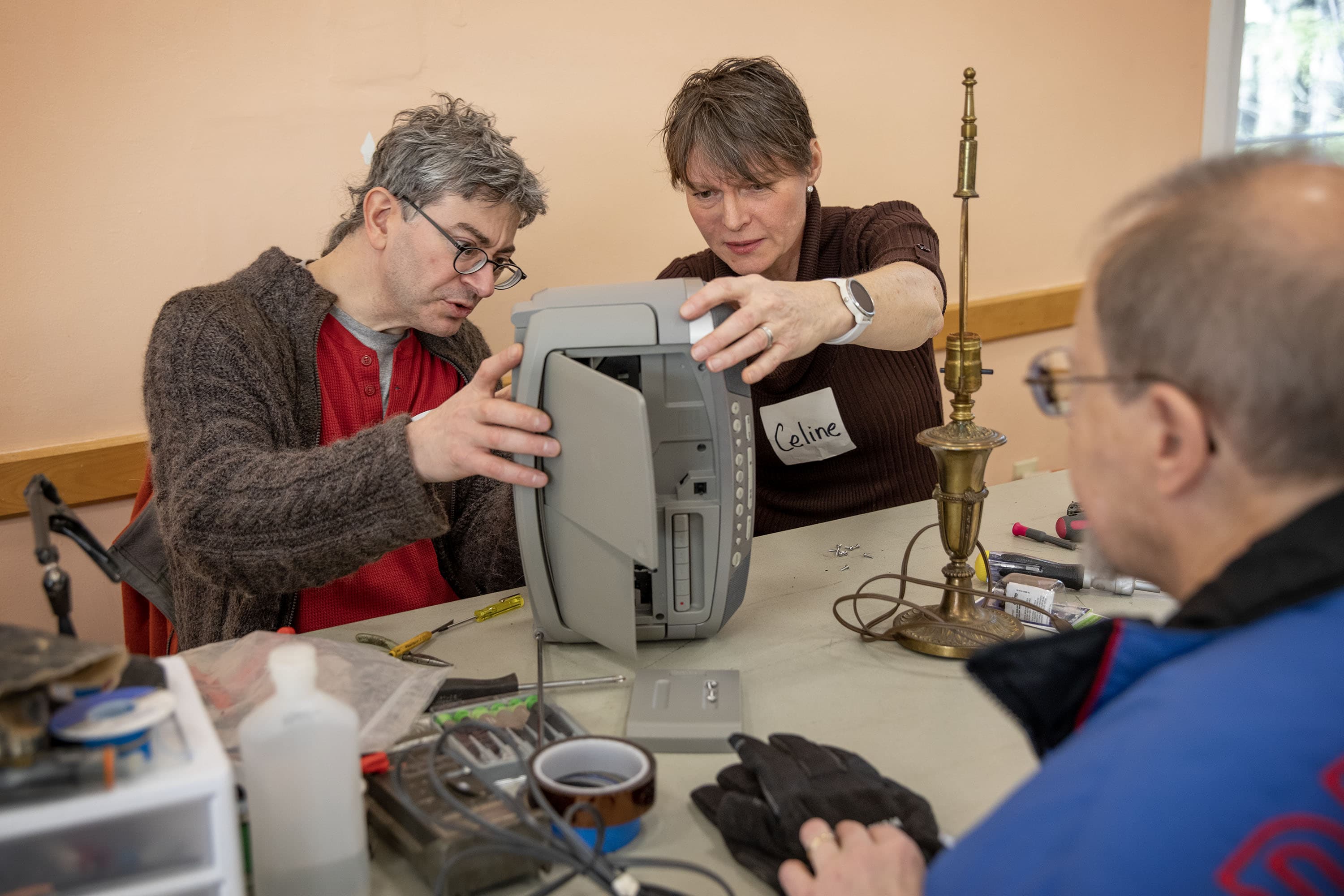
Celine Riard, an interior designer, is focused on a common item at Repair Cafes: lamps. Riard picks up a stately brass model, twists open the top, and sticks her finger inside.
“That little switch,” she says, tugging on a wire, “is usually the first thing that’s going to give up.”
In less than five minutes, Riard is testing a new switch.
“Yep, it’s working. Done,” she announces. “Helping people, fixing things, you know, it really gives you a sense of purpose.”
The lamp’s owner, June Joyce, is a volunteer at the jewelry repair table. Allexe Law has brought Joyce a necklace Law’s great aunt made. The chain was too delicate and kept snapping. The necklace has been sitting around for about 20 years.
Joyce threads the beads onto a sturdier chain. Together, Joyce and Law decide to turn broken bits of the sentimental chain into an ankle bracelet.
“It’s creative, it’s recycling,” says Joyce. “It’s waste not, want not,” adds Law, finishing the sentence.
Little goes to waste in this room. A scrap of black fabric is just what Alison Quackenbush needs to fix a strap holding on by a few threads to Don Gage’s backpack.
“I have some heavy things in there at times,” says Gage with a shrug. “When I’m going for a hike, I’ll add 20 pound weights just to make it a little heavier.”
“OK,” laughs Quackenbush, “so I better do a good job.”
The repair takes a little longer than expected. The needle on Quackenbush’s sewing machine breaks. After about 15 minutes, Quackenbush finds Gage in the crowd and shows him the refashioned strap.
“It worked!” he says. Yes, Quackenbush tells Gage, but she’s not sure how long it will last if he keeps carrying around weights.
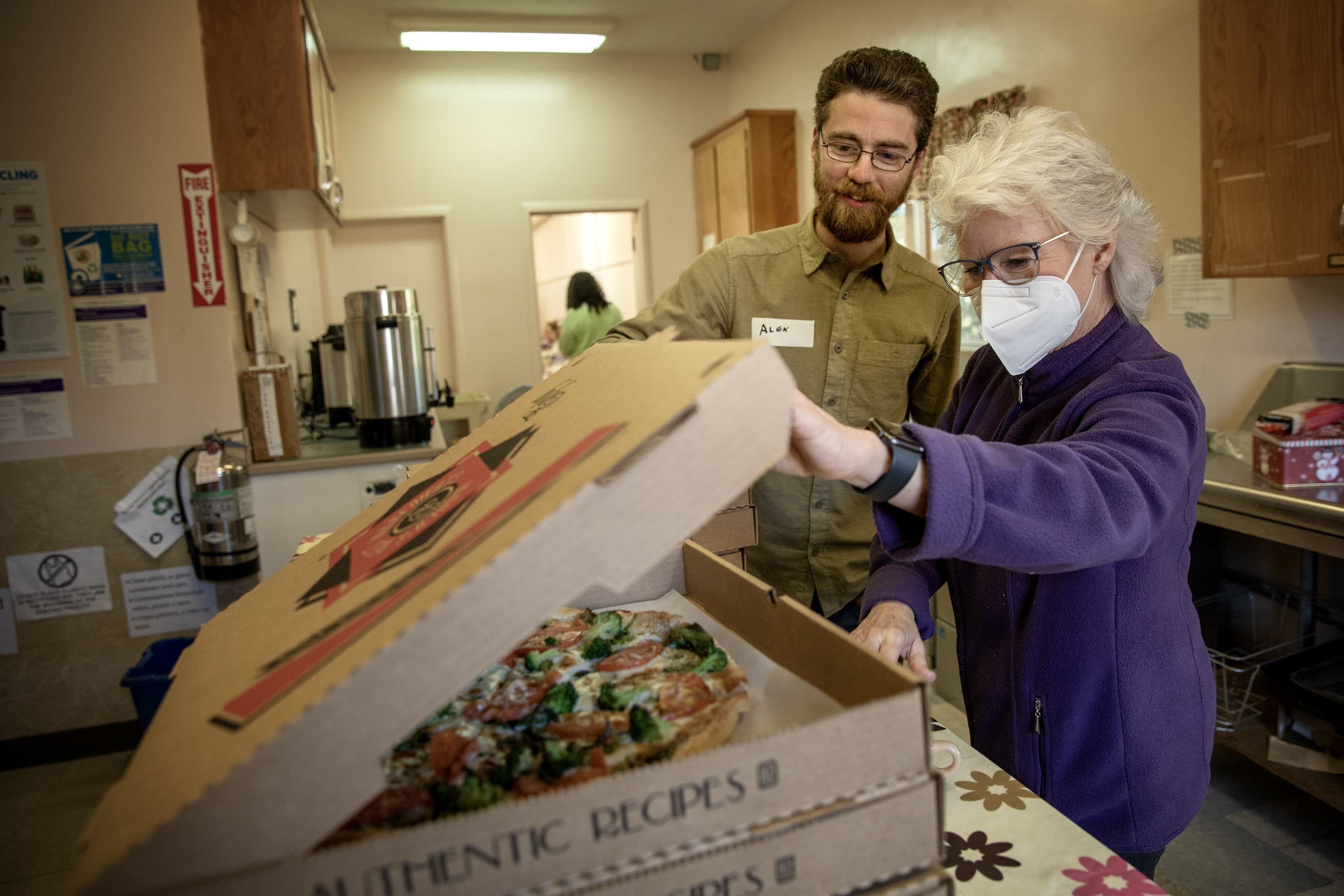
To Repair Cafe organizer Volfson, these interactions are helping Framingham become a stronger, more self-sustaining community.
“If we can fix it ourselves, that’s local resilience, right?” he says. “Dependence would be, I go to a big box store for everything I need.”
There’s a climate benefit, albeit small, for each repair. That new backpack or toaster oven or sweater you buy after you throw the old one away “came in on a truck, which came in on a boat, which came from another country. One of those uses a lot more fossil fuels than the other,” says Volfson, who helps lead another local volunteer group Transition Framingham.
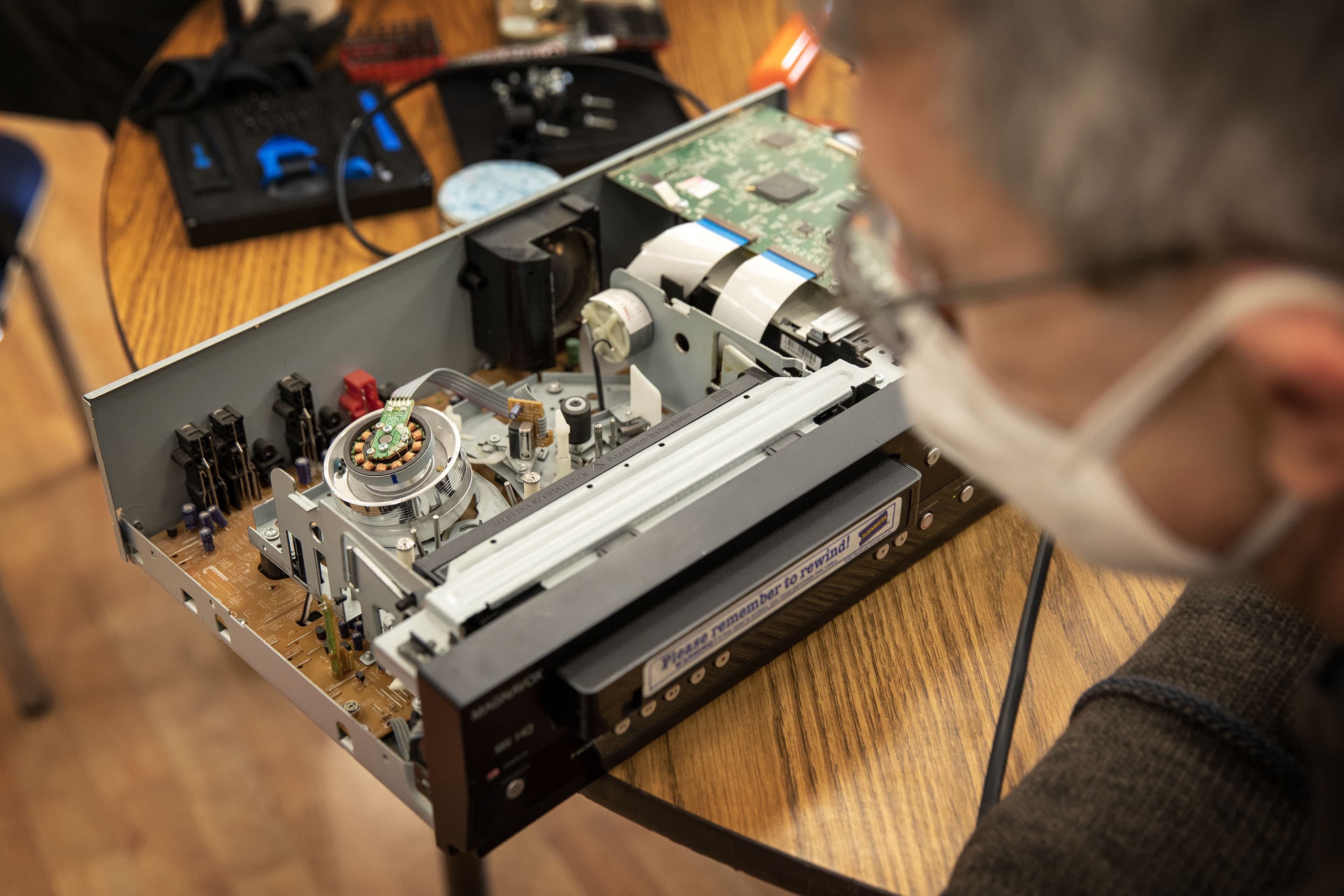
Not everything placed in front of volunteers today can be fixed on the spot — or at all: a jacket with an unusual zipper, a VCR and a coffee percolator stump the experts. One volunteer agrees to keep working on a 1920s era sewing machine, if he can find the parts. And 10-year-old Abdul Senusi won’t be able to ride his black and orange BMX bike home. It needs a new chain.
But Senusi, whose mom talked him into coming, is captivated by all the action at repair tables.
“I thought it was going to be only the bike thing,” he says, “but it turns out there’s like all these things. So then I was like, this place is actually cool.”
Senusi’s mom, Safiyat Hamiss, stands by the sharpening table with half a dozen gardening tools. Her small business, Tasty Harvest, helps people start small gardens.
“I’m ready for the season,” Hamiss says with a laugh.
At 5 p.m., as the cafe wraps up, 80% of more than 100 broken items have been repaired. Volunteers pack up and put away the portable tables, except one. Jim Rutherford and Brenda O’Malley keep one of the computer repair stations open until six, when the transfer of files from an old computer to a new one is finally finished.
This segment aired on March 4, 2023.
